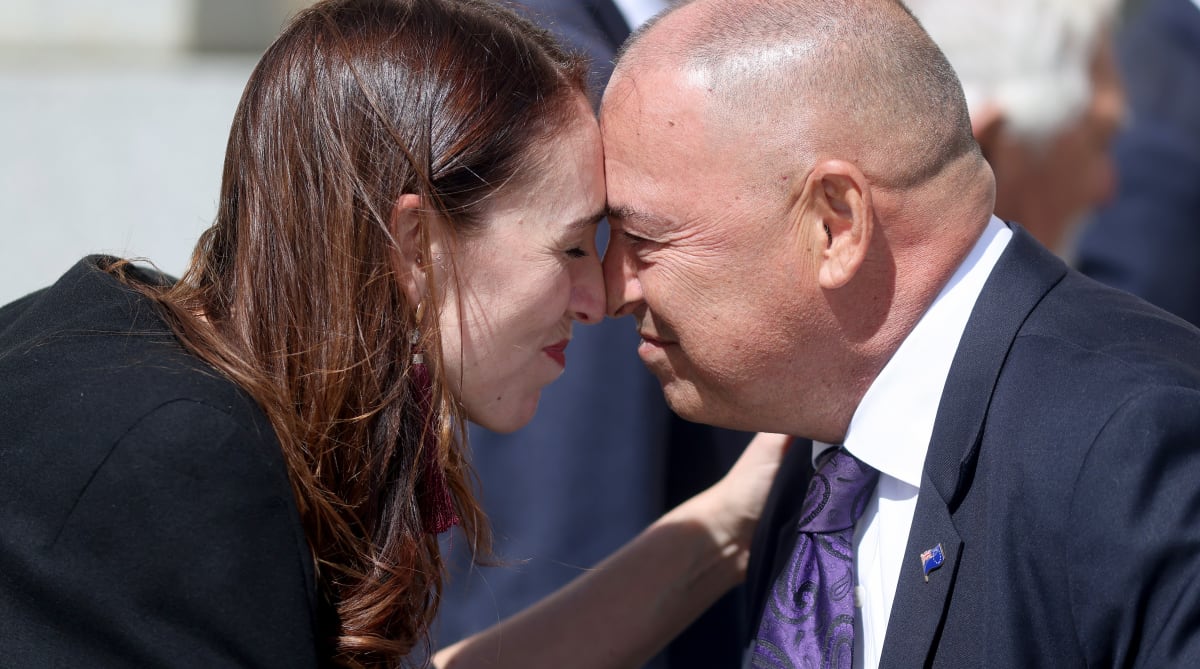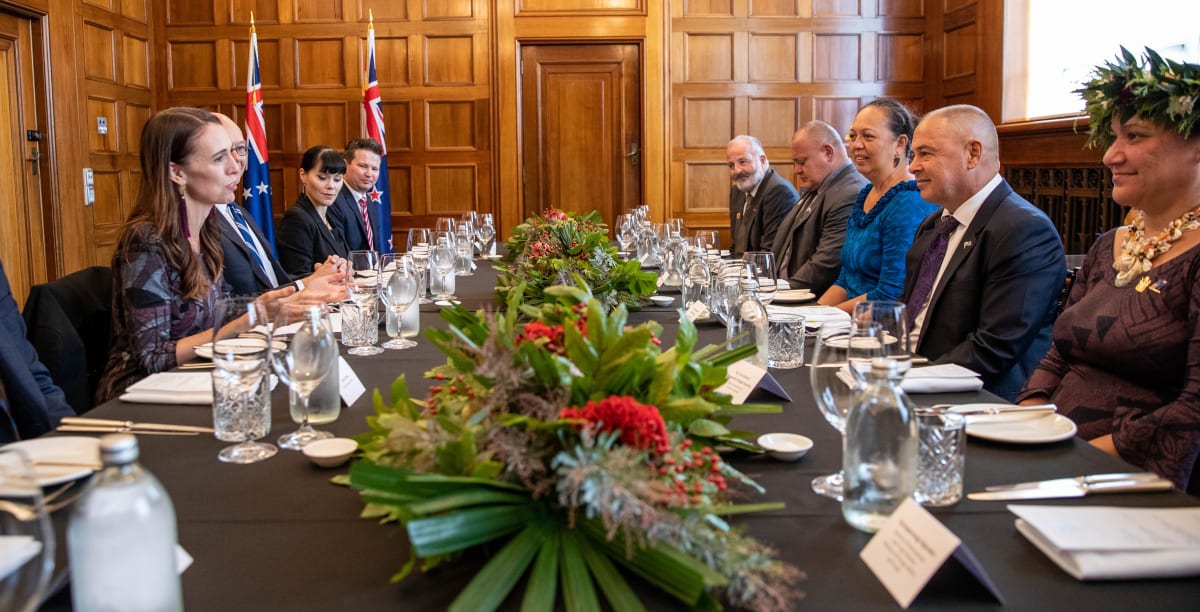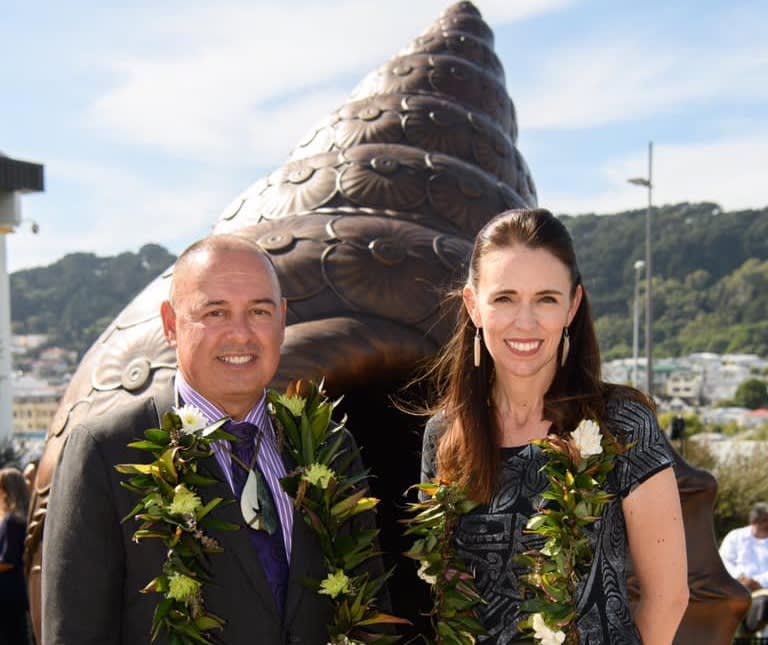New Zealand is expected to take on legal and financial liability for the potentially fraught roll-out of Covid-19 vaccines in Cook Islands and any other Pacific nations it assists.
Many governments have agreed to accept liability for any problems or adverse reactions in vaccinating their own populations – but the New Zealand Government is going further. It is in talks with vaccine manufacturers, to indemnify them from all liability when New Zealand supplies their products to vulnerable Pacific nations. This country would take on all the risk.
Quickly and safely distributing the vaccine within New Zealand is an unprecedented logistical challenge; getting it injected into the arms of people on remote Pacific atolls is more challenging still. Tokelau, one of the realm states for which New Zealand has purchased vaccine doses, is a 24-hour boat trip from Samoa. There are no airports or runways on its three tropical atolls.

And Cook Islands has 12 populated islands, spread across nearly two million sq km of ocean, some with as few as 35 people living on them and again, no airstrip.
Cook Islands Prime Minister Mark Brown met with Jacinda Ardern in Auckland on Friday, and then again in Wellington on Saturday. He will meet with other ministers over the next few days. He is asking that New Zealand provide his country with enough doses of the Pfizer vaccine to protect the whole population.
Cook Islands health officials were due to arrive in Wellington this weekend, he said, to work with their New Zealand counterparts to complete surge capacity testing and learn how this country is delivering its Pfizer vaccine.
Ardern has not yet confirmed a date to begin the general rollout of the vaccine in New Zealand, but Brown said she had agreed to roll out the vaccine in Cook Islands in May.

That would entail significant complications: our officials believe the Pfizer vaccine must be administered within five days of leaving its super-cold storage in New Zealand.
That timeframe would almost certainly mean mobilising New Zealand Defence Force medics, on Air Force Hercules, Orions and helicopters to distribute it to Rarotonga and around the other populated atolls. Then, the entire exercise would have to be repeated three weeks later for the second Pfizer dose.
The alternative is to persuade the Cook Islands Government to accept a different vaccine, most likely the Janssen one that doesn’t require super-cold storage and transport, and can be administered with a single shot. But that vaccine has not yet been approved by Medsafe.
Jacinda Ardern said her Government had committed, right from the beginning, to buying vaccines on behalf of the Cook Islands, Niue and Tokelau.
“We do need to resolve some liability of the onward distribution. And so we’re working very hard on that, to get the tick-off from those pharmaceutical companies.”
– Jacinda Ardern, Prime Minister
She confirmed those countries would get the vaccine in parallel with the New Zealand population – and perhaps sooner. “Logistically, it makes good sense that in some cases we go in and start the roll-out in its entirety given the population base, relative to the five million that we’ll be doing in New Zealand.”
“One of the things we need to sort first, though, is the liability issues,” she added. “It is something we’ve raised with those pharmaceutical companies that we’ve purchased from, that it is incredibly important for us to fulfil our obligations and provide those vaccines.
“In order to do that we do need to resolve some liability of the onward distribution. And so we’re working very hard on that, to get the tick-off from those pharmaceutical companies.”

Asked whether the discussions were about liability for the failure of the drug, or the cost of it, or the shipment to the islands, or any side-effects, Pfizer spokesperson Helen Han declined to comment.
But it’s known that New Zealand has agreed to indemnify Pfizer and BioNTech for more than $10 million. Finance Minister Grant Robertson was legally required to disclose it to Parliament. Treasury said the indemnity shielded Pfizer and BioNTech from any potential legal action over use of the vaccine.
Han said she could not discuss the terms and conditions of the company’s supply agreement with New Zealand, as it was subject to a confidentiality agreement. But she said: “We support all efforts aimed at providing developing nations with the same access to vaccines as the rest of the world.”
“If approved by Medsafe, the new storage option could offer greater flexibility to help the New Zealand Government manage and maintain vaccine distribution and supply.”
– Helen Han, Pfizer
Pfizer and BioNTech submitted vaccine stability data to Medsafe this month. Han said this data proved that their Comirnaty vaccine could be stored at standard freezer temperatures of -25°C to -15°C for up to two weeks. “If approved by Medsafe, the new storage option could offer greater flexibility to help the New Zealand Government manage and maintain vaccine distribution and supply,” she said.
Although talks with manufacturers are still underway, it is understood New Zealand will accept liability for the distribution and supply of the vaccines in the Pacific, as well. But our health officials are not yet convinced by Pfizer and BioNTech’s storage arguments, and are not willing to risk using the vaccine after it’s been shipped around the Pacific in regular freezers for a fortnight.
The Pfizer vaccine is just the first of four that New Zealand has purchased. It also has supply agreements with Janssen, AstraZeneca and Novavax.

The Janssen vaccine is seen by some health experts as the best option for distribution across the Pacific.
Janssen spokesperson Maeve Eikli said the company has agreed to supply New Zealand with up to five million doses on a not-for-profit basis, with the first two million of those this year, and the option to purchase up to an additional three million doses at a later date – subject to Medsafe approval and product availability.
The Janssen single-dose vaccine aligned with the World Health Organisation’s recommendations for medical interventions in a pandemic setting, emphasising ease of distribution, administration and compliance, she said.
“The consensus is that governments and the global community should provide appropriate protections for all parties involved in the development, manufacturing, funding, procurement, distribution, and administration of Covid-19 vaccines who are working to help end this pandemic as rapidly as possible.”
– Maeve Eikli, Janssen Pharmaceutica
It was estimated to remain stable for two years at -20°C, and up to three months at routine refrigeration at temperatures of 2 to 8°C, she said. “We believe our current distribution channels include enough temperature-controlled trucks, containers and planes to deliver our vaccine to those in need around the world.”
Janssen’s views on liability protection were aligned with COVAX, Gavi, CEPI and WHO, Eikli said, as well as other vaccine manufacturers and many experts at leading academic institutions specialising in global public health.
“The consensus is that governments and the global community should provide appropriate protections for all parties involved in the development, manufacturing, funding, procurement, distribution, and administration of Covid-19 vaccines who are working to help end this pandemic as rapidly as possible.”
Gnarly negotiations
Prime Minister Mark Brown will meet with Grant Robertson this morning, and Brown said they would discuss aspects of the Cook Islands economic recovery program. They will discuss the $20 million in no-strings-attached aid that New Zealand promised last week. And there is still the potential for change to the terms of the Pacific vaccine rollout and quarantine-free travel, in ministerial meetings this week.
Despite the rhetoric about quarantine-free “two-way travel”, what is actually being discussed is the return of New Zealand tourists.
Cook Islanders and work or residence permit holders are already allowed to travel both ways, without quarantine. But New Zealanders aren’t yet allowed to board the twice-weekly Air NZ flights to Rarotonga, until the two countries can agree terms.
Last week, Brown made bold promises to Cook Islanders about how hard he would work to secure a date to reopen the borders to tourists. He emerged from the first round of negotiations with some dignity – a loosely-worded agreement that they would “work towards” quarantine-free travel from May. The two countries have agreed, then abandoned, such timeframes at least twice before.
But that didn’t stop Brown issuing a press release later that evening, claiming he and Ardern had confirmed May for the Cook Islands to start receiving visitors from New Zealand. He made the same claim in a video-streamed statement the following morning.
“We are ready. We are ready to receive the visitors to come back into our country. We are ready to roll out the vaccinations that will be available to us very, very shortly.”
– Mark Brown, Cook Islands Prime Minister
The New Zealand Government has come to recognise such overstatement as a familiar tactic on his part. Last year, Brown repeatedly told officials and sometimes the media that the two countries were set to resume quarantine-free travel, in apparent attempts to put pressure on New Zealand, but his promised resumption of tourism never happened.
Similarly last week, after Newsroom reported health authorities’ concerns about the parlous state of Cook Islands Covid testing and contact-tracing, Brown issued a statement claiming Cook Islands had completed and would soon launch an updated contact tracing app that was compatible with the NZ COVID Tracer app. The interoperability was in anticipation of the two-way travel bubble between the Cook Islands and New Zealand, he said, and was only the second time a compatible system between two countries has been established anywhere in the world.
But Eve Hayden, the chief executive of Cook Islands Chamber of Commerce which commissioned the country’s contact tracing technology, said this weekend that they were still testing a contact-tracing app with Bluetooth functionality. They would then develop it further, to enable Cook Islanders to use the Bluetooth functionality when they visited New Zealand. At the same time, she said the NZ COVID Tracing app was undergoing further development to enable New Zealand visitors to the Cook Islands to continue using their app while travelling there.
There are also question to be resolved over just how many vaccine does New Zealand will need to supply. The Cook Islands Government says the island nation’s population is about 17,000, but there are few reliable up-to-date figures, and analysts put the number somewhere fewer than 14,000.
Either way, Ardern said full vaccination would provide an “extra layer of protection”, but resuming travel was not contingent on entirely vaccinating the population first.



